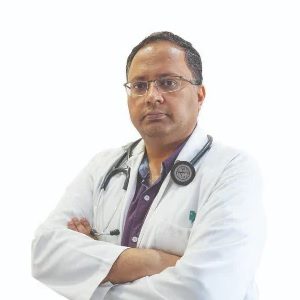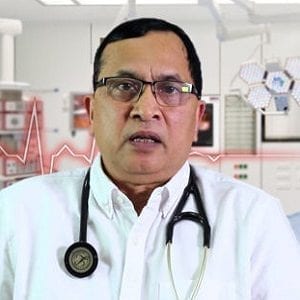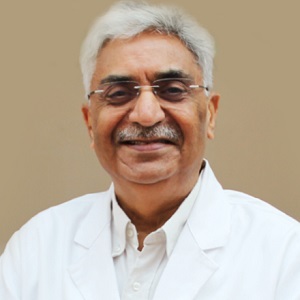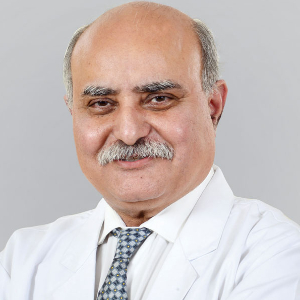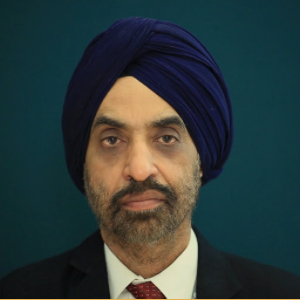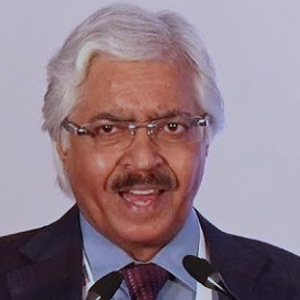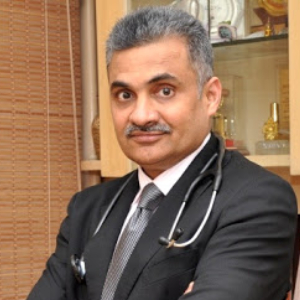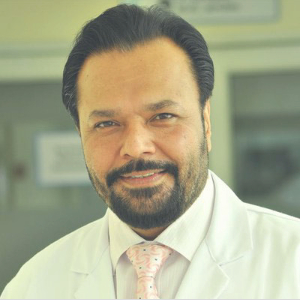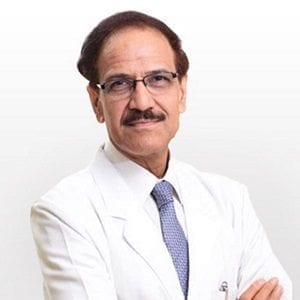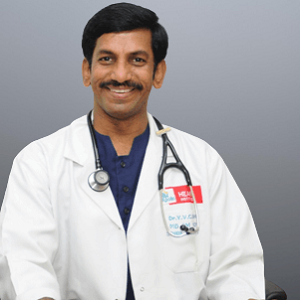Best Doctors in India for Myocardial Perfusion Imaging
- Interventional Cardiologist, New Delhi, India
- Over 23 years experience
Profile Highlights:
- Dr. Amit Mittal is a cardiologist working at Indraprastha Apollo Hospital in New Delhi with experience of over 23 years in Interventional Cardiology.
- He is good to consult for Angiogram, Angioplasty, and Bypass Surgery. Dr. Mittal has performed over 15,000 cardiac procedures till now. He offers services like EPS and RFA procedures, pacemaker implantation, ECG, complex surgery of heart valve replacement, and angina treatment, to name a few.
- Apart from that, Dr. Mittal won a Gold medal in MBBS 1st y and for the highest marks in obstetrics and gynecology. He published many papers in national and international medical journals and chapters in textbooks.
- Cardio Thoracic & Vascular Surgeon, New Delhi, India
- Over 30 years’ experience
Profile Highlights:
- Dr. Bhaba Nanda Das is a well-known cardiovascular and cardiothoracic surgeon and has performed the first Coronary Artery Bypass Grafting (CABG) on a beating heart in India.
- He has performed over 20,000 cardiac surgeries and does more than 800 cardiac surgeries annually.
- With a keen interest in cardiovascular and thoracic procedures, Dr. Das is the first cardiac surgeon to use all arterial grafts for multiple coronary revascularizations. He was also the first to use coronary sinus in Fontan’s circulation.
- Vascular Surgeon and Interventional Cardiologist, Gurugram, India
- Over 30 years’ experience
Profile Highlights:
- Dr. T S Kler is undoubtedly one of the best vascular surgeons not only in India but also abroad. He has performed more than 25,000 Surgeries in his life which makes him stand where he is.
- He is a pioneer in electrophysiology & he established the first dedicated Electrophysiology department in India at Fortis Escorts Heart Institute.
- Dr. T S Kler initiated a radio Frequency Ablations programme at Escorts in 1993, one of the first of its kind in India. He was the first doctor in India to implant an ICD, CRT-P & CRT-D.
- Cardio Thoracic & Vascular Surgeon, New Delhi, India
- Over 30 years’ experience
Profile Highlights:
- Dr. Ajay Kaul is a leading name in the field of Cardiothoracic and Vascular Surgery in India with over 3 decades of experience.
- He specializes in Coronary Bypass surgery and is one of the best with the highest number of total arterial coronary bypass surgery (4000+) by using two internal mammary arteries from the chest and without any cuts on arms and legs.
- He is also an expert in minimally invasive cardiac surgeries (MICS) and has performed more than 4000 MICS which is the highest by any cardiac surgeon in India.
- Cardiologist, New Delhi, India
- Over 32 years’ experience
Profile Highlights:
- Dr. Balbir Singh is a reputed cardiologist with over 32 years of experience, considered a veteran in his field, both nationally and internationally.
- He has also pioneered several minimally invasive cardiology surgical techniques in India and has been honored with the prestigious Padma Shree Award for his exceptional performance.
- “LIMCA” Book of Records also highlighted Dr. Balbir Singh’s contribution to the medical field in the Indian Electrophysiology Journal.
- Interventional Cardiologist, New Delhi, India
- Over 30 years’ experience
Profile Highlights:
- Dr. Ashok Seth is one of the most well-known Interventional Cardiologists in India honored with both the Padma Shri and Padma Bhushan by the Government of India.
- He has more than 3 decades of experience in interventional cardiology and has performed over 20, 000 angioplasties and 50,000 angiograms till date.
- Dr. Seth holds a Fellowship of the Royal College of Physicians of Ireland, London, and Edinburgh along with several other degrees to his name.
- Interventional Cardiologist, New Delhi, India
- Over 20 years’ experience
Profile Highlights:
- Dr. Praveer Aggarwal is a nationally acclaimed and highly professional Interventional Cardiologist.
- His specialization lies in the treatment of blockages of the coronary and peripheral arteries and is an expert in Rotational and Directional atherectomy, intravascular ultrasound, pressure wire, and the use of Drug Eluting Stents.
- Along with his team at Fortis Escorts Heart Institute, Dr. Aggarwal performs close to 2000 angiographies and over 2000 coronary interventions including coronary angioplasties every year.
- Interventional Cardiologist, Gurugram, India
- Over 27 years’ experience
Profile Highlights:
- Dr. Manjinder Sandhu is a leading interventional cardiologist based in Gurugram who holds an extensive experience of over 27 years in the field.
- His primary interest lies in Complex Coronary Interventions, Trans-radial Interventions, and Balloon Valvuloplasty, and has performed a large number of such procedures in his career mainly while serving in the Army Medical Corps.
- Dr. Sandhu has been teaching and training postgraduate students in Cardiology and Medicine and has been a guide to several successful cardiologists in India.
- Interventional Cardiologist, New Delhi, India
- Over 20 years’ experience
Profile Highlights:
- Dr. Subhas Chandra is a leading Interventional Cardiologist who holds close to 20 years of experience and specializes in coronary interventions, endovascular interventions, device implantation, and structural heart diseases.
- He has performed more than 25,000 coronary interventions (complex angioplasty and rotablation), 4000+ for structural heart diseases, and has done more than 3000 permanent pacemaker implants.
- Interventional Cardiologist, Chennai, India
- Over 25 years’ experience
Profile Highlights:
- Dr. Y Vijayachandra Reddy is an interventional cardiologist with 25+ years of experience.
- Dr. Reddy’s work experience includes more than 7000 PCIs, 30000 invasive procedures, 550 PCIs in cardiogenic shock, 700 Cardiac devices, 400 PTMCs, and several EVAR and TEVAR procedures.
- His expertise lies in pacemaker implantations, pediatric interventions, ICDs, CRTs, endovascular repairs, and more.
Best Hospitals in India for Myocardial Perfusion Imaging
Fortis Escorts Hospital, New Delhi
- City: New Delhi, India
Hospital Highlights:
- Over the last 33 years, the Fortis Escorts Heart Institute has set new standards in cardiac treatment with groundbreaking research. It is now known around the world as a centre of expertise for Cardiac Bypass Surgery, Interventional Cardiology, Non-invasive Cardiology, Paediatric Cardiology, and Paediatric Cardiac Surgery.
- The hospital has cutting-edge laboratories that perform a wide range of diagnostic tests in Nuclear Medicine, Radiology, Biochemistry, Haematology, Transfusion Medicine, and Microbiology.
- Fortis Escorts Heart Institute boasts a diverse group of bright and experienced doctors who are backed up by a team of highly qualified, experienced, and devoted support professionals as well as cutting-edge equipment such as the recently installed Dual CT Scan.
- Approximately 200 cardiac doctors and 1600 personnel currently collaborate to manage over 14,500 admissions and 7,200 emergency situations each year. The hospital now has a 310-bed infrastructure, as well as five cath labs and a slew of other world-class amenities.
Rela Hospital, Chennai
- City: Chennai, India
Hospital Highlights:
- RIMC is a multi-specialty hospital in a sprawling area of 36 acres located in Chromepet, Chennai, Tamil Nadu, India.
- The facility has 450 beds including 130 critical care beds, 9 operating rooms, modern reference laboratories and radiology services, and is conveniently located near road, rail and air transportation.
- RIMC is led and managed by world-renowned physicians committed to healthcare.
- RIMC offers the broadest range of clinical care, education, and research. The hospital offers state-of-the-art technology and modern treatment facilities designed to provide health care at an affordable cost.
- Rela Institute is driven by patient needs, comfort and confidence.
CARE Hospitals, Hyderabad
- City: Hyderabad, India
Hospital Highlights:
- CARE Hospitals were established in the year 2000, by CARE Group.
- The multispecialty hospital has 435 beds, including 120 critical care beds, with an annual inflow of 180000 outpatients and 16,000 in-patients.
- The hospital provides specialty medical services in Cardiology, Cardiothoracic Surgery, Pediatric Cardiology, Pediatric Cardiothoracic Surgery, Neurology, Neurosurgery, Nephrology, and Urology.
- The hospital has the first dual source, 128 slice CT scanner (for high precision cardiac imaging) – the first of its kind in south India.
- The hospital offers a wide range of accommodation facilities for the convenience of its varied patient base, ranging from general wards to super deluxe rooms.
Fortis Hiranandani Hospital, Mumbai
- City: Mumbai, India
Hospital Highlights:
- Fortis Hiranandani hospital was established in 2007.
- The hospital is an advanced tertiary care, multi-specialty hospital equipped with 149 beds.
- The hospital is equipped with a super ICU to provide emergency medical care to critically ill patients.
- The hospital is NABH accredited.
- The critical care facility in the hospital is augmented with the state-of-the-art facilities that facilitate speedier diagnosis and efficient monitoring.
- The hospital provides specialty medical services in cardiology, orthopedic science, pediatric science, neurology, diabetic care, urology, nephrology, ENT, obstetrics, gynecology, cosmetic surgery, bariatric surgery, neuro and spine care.
Fortis Hospital, Anandpur, Kolkata
- City: Kolkata, India
Hospital Highlights:
- Fortis Hospital, Anandapur, Kolkata is a world-class super-speciality equipped with the latest technologies in the medical world.
- The hospital is NABH accredited.
- This state-of-the-art facility specializes in cardiology and cardiac surgery, urology, nephrology, neurosciences, orthopaedics, digestive care, emergency care and critical care.
- The hospital, governed by integrated Building Management System (IBMS), has a pneumatic chute system, for quick vertical and horizontal transportation between floors, facilitating speedy transfer of patient specimens, documents, reports, and medicines to the concerned departments.
- The hospital also has a nephrology department with over 28 advanced dialysis units.
Fortis Hospital Banerghatta, Bengaluru
- City: Bengaluru, India
Hospital Highlights:
- Fortis Hospital Bannerghatta, Bengaluru was established in 2006.
- The hospital is a 276 bedded multi-specialty tertiary care facility.
- The hospital specializes in cutting-edge medical technology and dedicated patient care services.
- The hospital is equipped with state-of-the-art technologies like trans-radial angioplasty, trans-abdominal cardiac surgery, and computerized TKR navigation surgery.
- The hospital provides specialty medical services in cardiology, cardiac surgery, orthopedics, neurology, neuro-surgery, GI, and Minimal Access Surgery (MAS).
Fortis Hospital, Malar, Chennai
- City: Chennai, India
Hospital Highlights:
- Fortis Malar was established in 1992 and was formerly known as Malar Hospital.
- The hospital specializes in cutting-edge medical technology and dedicated patient care services.
- The hospital is multi-specialty, tertiary care facility with 180 beds.
- The hospital offers comprehensive medical care in specialties such as cardiology, cardio-thoracic surgery, neurology, neurosurgery, orthopedics, nephrology, gynecology, gastroenterology, urology, pediatrics, and diabetes.
Gleneagles Global Hospital, Parel, Mumbai
- City: Mumbai, India
Hospital Highlights:
- Gleneagles Global Hospital The 450-bed facility comprises of 17-stories, housing state-of-the-art infrastructure, and advanced medical care facilities.
- The hospital offers end-to-end clinical, surgical, and diagnostic services. It is equipped with a team of eminent medical professionals aided by qualified nurses and medical staff
- The Hospital offers advanced Endoscopic procedures, Hepatobiliary and Liver Surgeries, Surgical and Medical Gastroenterology, Bariatric Surgery, and Robotic surgery.
- The hospital is a center of excellence for Orthopedics, Joint Replacement, Knee Replacement, and Hip Replacement surgery.
Jaypee Hospital, Noida
- City: Noida, India
Hospital Highlights:
- Jaypee Hospital is the flagship hospital of the Jaypee Group.
- This hospital has commissioned 525 beds in the first phase and has been planned and designed as a 1200 bedded multi-specialty facility.
- It holds the accreditation of the NABH and NABL.
- The hospital has state-of-the-art infrastructure equipped with the latest technologies and modern equipment like 64 Slice PET CT, Dual Head 6 Slice SPECT CT, Gamma Camera, and Da Vinci Robotic Surgery for comprehensive robotic surgical solutions.
- It has special Centers dedicated to the major specialties to provide hassle-free and high-quality clinical care.
Manipal Hospital, Dwarka, Delhi
- City: New Delhi, India
Hospital Highlights:
- Manipal Hospitals, Dwarka, is a super-specialty hospital in Dwarka, New Delhi, which is a part of Manipal Hospitals Group.
- The hospital aims to provide the best treatment on par with international standards at a fraction of the cost.
- Equipped with 380 beds, the hospital is also one of the new age hospitals which are equipped fully with state-of-the-art infrastructure, cutting-edge technology as well as the latest and advanced clinical practices. The hospital also has 13 modular Operation theatres with 118 beds which are solely meant for critical care.
- The hospital comprises internationally acclaimed doctors and highly professional and experienced hospital and medical staff who are able to provide preventive, therapeutic, and diagnostic services all under one roof.
Myocardial Perfusion Imaging
Our heart muscle needs a steady flow of blood for functioning properly and staying healthy. Myocardial Perfusion Imaging (MPI) is a non-invasive method that lets your doctor evaluate this blood flow. The scans can also be used to look for damage after a heart attack and for determining if any previous treatment has helped.
While perfusion assessment might require you to exercise, the testing process is safe as well as painless.
Purpose
An MPI test is able to show how well blood is able to flow through the heart muscle. If the test shows a lack of blood flow during stress or exercise but is normal at rest, then it can mean that an artery that carries blood to your heart might be narrowed or blocked.
If the test is showing a lack of blood flow to a portion of the heart muscle during exercise or stress, and at rest, it can mean that your heart muscle is scarred, possible from a previous heart attack.
MPI tests can help your doctor in various ways such as:
- Finding out if there are blockages or narrowings in your coronary (heart) arteries if you are having chest discomfort
- Determining if you need to undergo a coronary angiogram
- Determining if you have heart damage from a heart attack if your heart is not functioning normally
- Deciding whether you would benefit from the coronary stent or bypass surgery for treating your chest discomfort or helping an abnormal pumping function go back to normal
- Determining how well your heart is able to handle physical activity
- Determining if a heart procedure you had to improve your blood flow is working properly
Preparation
Let your doctor know about any medications that you take, such as over-the-counter medicines, vitamins, or herbs. He/she may ask you not to take them before your test. Remember not to stop taking your medication until your doctor tells you to.
Your doctor might ask you to avoid certain foods, such as caffeine-containing beverages, such as tea, coffee or soft drinks, or chocolate, for around 24 hours before the test is performed. The test might need to be postponed or canceled if you consume caffeine.
Remember to wear comfortable and loose-fitting clothing as well as comfortable shoes to exercise in.
Procedure
The test is performed in a hospital or a clinic with special equipment.
The technician places small metal disks known as electrodes on your chest, arms, and legs. These disks have wires that hook up to a machine for recording your electrocardiogram. The ECG can keep track of your heartbeat during the test, and can be used to tell the camera when taking a picture is required.
You will next wear a cuff around your arm in order to keep track of your blood pressure. Your technician will be putting an intravenous line in your arm. Then you will need to exercise on an exercise bicycle or on a treadmill. If you are unable to exercise, due to certain conditions, then your IV line is connected to a bag that has a medicine, for increasing the blood flow, to your heart. This medicine has an effect similar to when you exercise, and makes the heart go faster.
When you reach the peak activity level, you will need to stop after which you will receive a small amount of radioactive material through your IV line.
You will lie still on your table for a few minutes while the gamma camera will take pictures of the heart. During this time, several scans are done to provide pictures of thin slices of your entire heart from all different angles. It is also very important to be completely still with your arms above your head, as the pictures are being taken.
While you are resting, you will be receiving more tracer, and another set of pictures will be taken as well. This set of images is going to be compared to the images taken after exercise or stress.
The test generally takes between 3- 4 hours. Some labs can choose to do the two parts of the test on different days.
After the procedure
You should be able to resume your normal routine right away. Remember to drink plenty of water to flush the radioactive material from your body.
Next, you will need to make an appointment with your doctor in order to discuss the test results and the next steps.
Risks
There are certain risks that are associated with an MPI test.
Sometimes the exercise part of the test can lead to rare instances of abnormal heart rhythms or chest pain. Sometimes it might also lead to a heart attack due to the stress on the heart that is caused by the exercise.
The needle that is used to inject the IV might cause some pain. The injection of the radioactive tracer might also cause a little discomfort. Although rare, sometimes there might be allergic reactions to the tracer.
Make sure you talk to your doctor regarding the amount of radiation used during the procedure and the risks related to your particular situation.
Depending on your specific medical conditions, there might be sometimes a few other risks as well. Therefore before you undergo the procedure, make sure your doctor knows about all your medical conditions.

